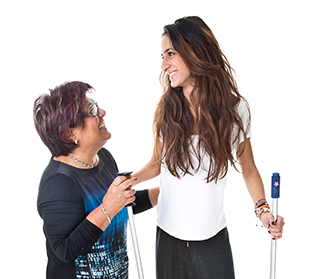 Neurological disorders cause special issues of emotional and physical stress that may be new and demanding for young adults. This transition from childhood can be an equally demanding time for their parents and siblings.
Neurological disorders cause special issues of emotional and physical stress that may be new and demanding for young adults. This transition from childhood can be an equally demanding time for their parents and siblings.
Physically:
- Teenagers may experience aches and pain caused by the cumulative effect of years of compensatory movements
- New complications arise in planning and executing the wider range of body movement necessitated by a rapidly changing physique
- Young adults may experience difficulty coping with life at the pace apparently required by others
In addition to the usual physical changes of puberty, young adults also
- Become emotionally aware for the first time of additional pressure from peers and society to ‘fit in’ and look good
- Are more self-conscious about their posture and movement, comparing themselves critically to peers and siblings
- Start to worry about their long-term future and their ability to cope with independent living
At this stage, they feel highly motivated to make changes and it is important to take advantage of this opportunity and encourage them to maximise their potential.
Neuro-physiotherapy for young adults
It is often easier for a young adult to be open about their worries and frustrations with an outsider who has experience of their condition. We begin by listening, acknowledging, and then working to focus on issues that we can address together. Their participation is critical to achieve any necessary changes. Young adults need to consider:
- The process of breaking down movement patterns into component parts that will form the basis of lifelong ability
- Learning correct posture and muscle alignment
- Stretching and mobilising joints
- The sensation of movement which may not come naturally to them
- Practicing movements until they achieve a sense of freedom and understanding and it becomes second nature to them to reproduce these movements in daily life
Sometimes we will teach them a special ‘vocabulary’ that they can use to initiate required movements. Alternatively we can use music to help combine individual movement patterns, vary speed and improve rhythm and co-coordination.
This process of establishing realistic goals and providing the means to achieve them can be a surprising, enjoyable and fulfilling experience for all of us.
We also offer support with:
- College, university and work environments
- Visits to orthotics/wheelchair/seating clinic
- Enabling recreational activities
Please do not hesitate to contact us by email or phone to discuss the individual issues relevant to you and your family and how we may be able to best support you with these.
